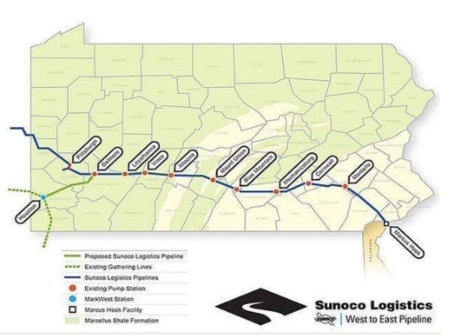New Jersey’s adoption of preserved land protection in the face of pipeline threats presents a good model for protections in Pennsylvania and other states.
SADC to Pipeline Companies: Stay off Preserved Farms
The State Agriculture Development Committee (SADC) has provided a procedural overview that highlights many potential roadblocks for pipeline development in New Jersey. These procedures deny attempts for intrastate gas pipelines and electric utilities to cut through preserved farms. The procedures show statewide implications for pipeline companies to adhere to, including no other mechanism to obtain rights of land without condemnation, and setbacks to obtain eminent domain. It includes a long approval process for right of easement, compensation of impacts to land owners and SADC, in addition to forcing the company to use a higher assessment value for preserved farms based on if they were developed.
“We applaud SADC’s position that they cannot sign away their easements on preserved farmland. The people of New Jersey paid to protect these farms from development, not to save them from pipeline companies to through them. SADC is standing up for open space and against these damaging pipelines,” said Jeff Tittel, Director of the New Jersey Sierra Club. “The SADC policy is not to let them come on or survey your land. The pipeline companies do not have this right since the development rights are owned by the SADC. This cannot be done until after they do surveys. By keeping them off your land, you can prevent them from getting eminent domain powers. This has statewide implications because pipelines tend to target open space and preserved farmland.”
The SADC requires utility companies to gain easements or rights to the land along the proposed route prior to submittal of application. Current law governing the New Jersey’s Farmland Preservation Program (FPP) (the “ARDA”, N.J.S.A. 4:1C-11, et seq.) makes it difficult to transfer easements. Even more important, this applies to all pipelines. The SADC explicitly states natural gas intrastate pipelines and electric entities do not have eminent domain. The only way these companies can obtain rights to cross preserved farmland is if a Court approves condemnation.
“The SADC’s position is a serious blow to the pipeline industry in New Jersey. Projects that do not have eminent domain or pipelines that do not cross state boundaries cannot cross a preserved farm. That would prevent the Pilgrim Pipeline and South Jersey Gas and New Jersey Natural Gas proposals from crossing a preserved farm,” said Jeff Tittel. “The SADC decisions come on top of the NJDEP letter last week saying that the PennEast application was incomplete because people didn’t let them survey. These pipelines cut through environmentally sensitive areas, cut through important category 1 streams, and create an ugly scar through our communities. This is a one two punch. It shows that by sticking together and not letting them on your property, we may have the tools to stop this project. Without allowing them on your property, they cannot obtain eminent domain. You should tell them, ‘I don’t hold the development rights, talk to SADC.”
Another setback in a utility’s decision to cut through a preserved farm includes the cost of impacts like crop loss, interference with the planting season, or other damages. That means any damages to the value of the development rights previously purchased must be reimbursed to the grantee (the county/SADC/nonprofit) by the utility company. Another payment goes to the landowner, who is reimbursed because the value of those impacts of the preserved farmland they own.
“Not only can you keep pipeline companies from getting on your property, but if they try to take your property they will have to pay a lot more. They would have to pay you, the SADC, and other agencies; must pay fair market value based on development potential, and consider crop losses and other additional costs. This means the amount of money to receive eminent domain will be significant. That’s why they want to cut a deal with you because they know they would have to pay more if they have to go to court, including lawyer fees and everything else,” said Tittel.
The appraisal process could be another long and costly hurdle for utility companies. The utility company must state exactly what areas of a farm will be affected by the condemnation, and seek new utility easements for those areas. Even more stringent, the appraisers must value the impacts of the project based as if the property was NOT preserved. That means the impacts must be paid based on the value of developed property. Importantly, unpreserved farms are not necessarily the most cost effective.
“One of the lies from the pipeline companies is that if you don’t let them on their land under eminent domain, you will get less money. However, SADC says the appraisal determination is at a higher value because they need to purchase the full development rights. That means it pays you to not let them on your property and force them to go to Court,” said Jeff Tittel. “Even if the development rights are severed, the value of the property is based on if the preserved farm were developed. This puts a monkey wrench into pipeline companies running destructive projects for preserved farms. N.J. has preserved over 150,000 acres of farmland. We have spent a total of $500 million on these properties. This is land paid for by the tax payers and held in the public trust. We are saving farmland to grow crops not pipelines.”
The SADC must approve the appraisal offered and or it has to be fixed in Court based on the fair market value of the easement. The utility company must first obtain the right to construct their projects through a court order to condemn farmland preserved property before the SADC can consent to the negotiated value. SADC can assist landowners, however they make it clear that they cannot provide legal advice to landowners nor represent them through the condemnation process.
“This will not only stop pipelines from going through preserved farms, it may stop pipeline projects all together. It will take these projects longer, slow down the process, and is an important decision in the arsenal to stop pipelines from cutting through our land. There are proposals to push all types of dirty fuel pipelines all over New Jersey. There at least 11 pipelines that have either been approved or proposed crisscrossing our state, changing us from the crossroads of the Revolution to the crossroads of pipelines,” said Jeff Tittel, Director of the New Jersey Sierra Club. “All the public outcry and the people who have said no to these projects is the reason SADC has made a strong commitment to preserve these lands. The advocacy and public opposition has helped SADC do its job. SADC to Pipeline Companies: ‘Can’t Touch This.’ ”Written By Jeff Tittel | POLITICKERNJ









